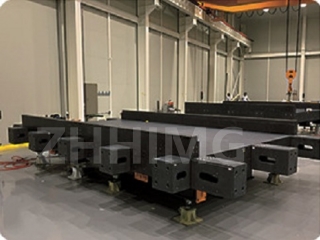Granite has always been the preferred choice for precision surfaces in the semiconductor and solar industries. This choice is driven by the unique properties of granite, which make it ideal for use in high-precision applications. In this article, we will explore why granite is a better option than metal for precision granite in the semiconductor and solar industries.
First and foremost, granite is a naturally occurring stone that is extremely hard and durable. Its toughness and resistance to wear and tear make it ideal for use in applications where high precision is required. In contrast, metals are susceptible to wear and tear, and they warp and deform over time under high stress. Granite, on the other hand, maintains its structural integrity and precision over time, making it an ideal choice for precision surfaces.
In addition to its durability, granite also has a low coefficient of thermal expansion. This means that it is less likely to expand or contract under different temperature conditions. In precision applications where even small variations in temperature can affect accuracy, granite provides a stable and reliable surface to work on. Metals, on the other hand, expand and contract more dramatically under temperature changes, which can lead to inaccuracies in precision applications.
Moreover, granite is non-magnetic, which is a critical consideration in the semiconductor and solar industries where magnetic interference can cause electronic equipment to malfunction. As a result, granite is frequently used in clean room environments where there is a high level of sensitivity to magnetic fields. Metals, on the other hand, are often magnetic and can interfere with precision equipment that is employed in these industries.
Another advantage of granite is its high density, which makes it extremely stable under heavy loads. This stability is crucial in high-precision applications where even the slightest vibration can cause inaccuracies. Granite's vibration damping capability makes it an ideal choice for applications where precision is of the utmost importance.
Finally, granite is also aesthetically pleasing and can be polished to a high gloss. This feature is not important for precision applications but adds to the overall appeal of equipment used in semiconductor and solar industries. The metal surfaces are prone to corrosion which reduces its aesthetic over time.
In conclusion, precision granite surfaces have become an integral component of high-tech applications in the semiconductor and solar industries. While metal may seem an attractive alternative, the unique qualities and advantages granite offers far outweigh any benefits that metal may have. Its durability, thermal stability, non-magnetic properties, vibration damping, high density, and aesthetic appeal make it an ideal choice for precision granite surfaces in high-precision applications.
Post time: Jan-11-2024

